A One-Stop Shop for Health Care in Suburban North Carolina
"We're kind of like a mini hospital," explains Ms. May Thao, patient care coordinator at Burke Primary Care, a comprehensive family practice that offers a wide range of health care services at the foothills of the Blue Ridge Mountains in Morgantown, North Carolina. "We basically do everything here. It really sets us apart from other clinics."
 The practice serves a scenic, suburban community that's fueled by North Carolina's famous furniture and textile industries. In addition to providing medical care through a team of 16 clinicians and staff, Burke Primary Care offers diabetes education, occupational health services and mammography, xray, ultrasound, IV and laboratory services all under one roof. The clinic even has a wellness provider on staff that visits local factories to check on workers' health.
The practice serves a scenic, suburban community that's fueled by North Carolina's famous furniture and textile industries. In addition to providing medical care through a team of 16 clinicians and staff, Burke Primary Care offers diabetes education, occupational health services and mammography, xray, ultrasound, IV and laboratory services all under one roof. The clinic even has a wellness provider on staff that visits local factories to check on workers' health.
Mr. Scott Gallagher, the practice's chief operating officer, highlights how offering a variety of services in-house has simplified care at Burke. "A couple of years ago, the local outpatient breast imaging center shut down, making our patients wait longer to get mammograms at the local hospital," he says. "We decided to bring in a mammography suite, and now we can just walk patients down the hallway to get it done. We also purchased a digital camera, so instead of sending patients out to a specialist for a diabetic eye exam, we can now take their pictures here and get them read by an ophthalmologist."
Filling in health care gaps is a specialty of the clinic and its staff, including May. Her role as patient care coordinator was created two years ago to help monitor patients who have long-term health issues or who are at high risk for developing an illness. May identifies and connects them to additional health care services that they need. "I have about 40 or 50 patients that I call on a routine basis to make sure their health is stable," she says. "I've learned that most of these patients depend on me checking up on them. Many are elderly and don't have children in the area, and they lack the social support they need. My call is vital to making sure things are okay at home. If there’s something we can do without an appointment—like referring them to over-the-counter remedies or refilling their prescriptions—I'll do it."
"Some deep-rooted [health] habits can be hard to tackle."
May notes that these calls can sometimes fix issues. "Sometimes all they need is a simple modification in their diet, and they feel better," she says, noting that encouraging patients to change certain behaviors, like getting better nutrition, is an important goal for the clinic. "Some deep-rooted habits can be hard to tackle. However, I think a lot of my success has to do with my relationship with our patients' primary care doctors. Because patients know I work closely with their physicians, they trust my advice."
This commitment to making it easier for patients to receive the care they need is one reason the physicians and staff members at Burke are so proud to work there. "Turnover is very low here," says Scott. "We take pride in taking good care of our patients in the exam room, and in the good communication between our doctors and their teams."
This story is courtesy of Heart Health NOW!, the EvidenceNOW North Carolina Cooperative.



